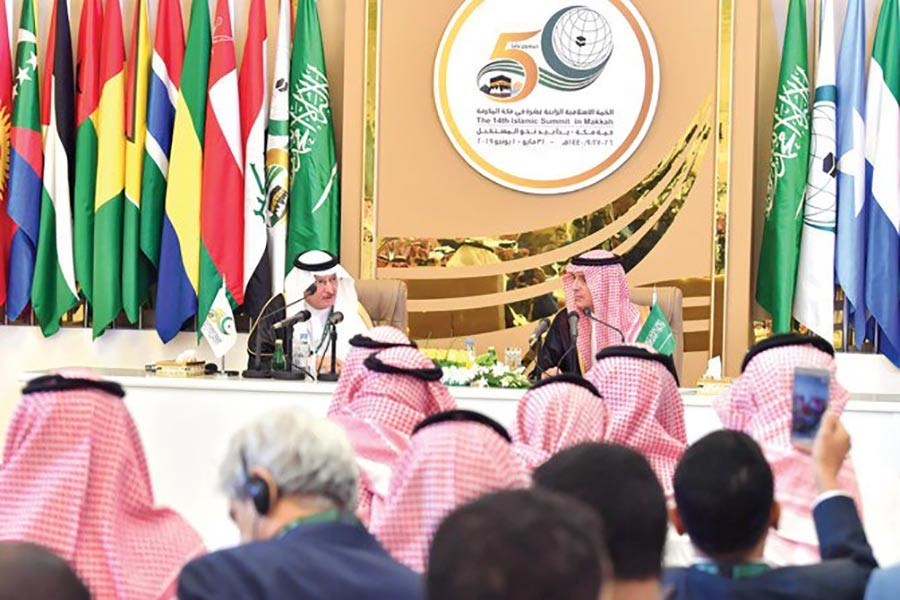The 14th summit of Organisation of Islamic Cooperation (OIC) took place in Makkah on May 31 - June 01, 2019. Heads of governments and states and delegates of 57 countries joined the conference. The theme of this year's conference was "Makkah Summit: Together for the Future" aimed at evolving a united position to effectively address the prevailing crises in the Islamic world.
With a population of over 1.8 billion covering four continents and having 70 per cent of the world's energy resources, the OIC was established in Rabat, the Moroccan capital, on September 12, 1969. It is the second largest inter-governmental organisation after the United Nations (UN) comprising both Arab and non-Arab countries.
India, although not a Muslim-majority country, was invited to the 46th OIC meeting of the Council of Foreign Ministers on March 1, 2019, in Abu Dhabi as a "guest of honour", despite Pakistan's objection. With more than 11 per cent of all Muslims worldwide living in the country, India did qualify to be invited at the OIC foreign ministers' meet.
Theoretically, OIC signifies "the collective voice of the Muslim World" to protect and strengthen cohesion and cooperation amongst the Muslim countries. According to its Charter, OIC's objectives are to strengthen the bond of solidarity among the Muslim nations, increase cooperation, and defend national sovereignty, independence and to contribute to international peace and security.
While the OIC has successfully carried out several socio-cultural and economic ventures, its political power to implement its declarations and resolving crises has been very limited. Divided over varying policies, the OIC failed to respond positively to the invasion of Lebanon by Israel (1982), Iran-Iraq conflict (1980-88), Soviet intervention in Afghanistan (1979), US occupation of Iraq (2003), and the genocide in Bosnia (1992-95).
The just concluded OIC summit deliberated upon key concerns facing the Muslim World including, the protracted Palestinian issue, tensions between Saudi Arabia and Iran, the Rohingya crisis, and the rights of the people of Kashmir.
In his opening remarks, King Salman underscored that the rights of Palestinians remain the central issue of the OIC's work until the Palestinian people secure their legitimate rights. He said, "We reaffirm our unequivocal rejection of any measures that would affect the historical and legal status of Jerusalem." He regretted Trump administration's controversial decisions to relocate the US Embassy from Tel Aviv to Jerusalem and recognise Israel's sovereignty over the Golan Heights, and yet the undisclosed Middle East peace plan that ignores the independence of Palestine. These US decisions are not only 'illegal and irresponsible ' but also contrary to international law, he added.
King Salman also criticised arch-rival Iran accusing it of being engaged in "terrorist acts" that targeted the kingdom. It was King Salman's strongest words since the tensions flared up. He warned that "terrorist" attacks in the Gulf region could jeopardise global oil deliveries and the world must confront the sources as well as funding of terrorism across the world.
Tehran vehemently denied being involved in the incidents and the foreign ministry spokesman Abbas Mousavi blamed that Saudi Arabia was abusing its authority as the host of the OIC in sowing seeds of division between the Islamic and regional countries.
At the summit, Bangladesh Prime Minister Sheikh Hasina sought support of the OIC Members for filing cases with the International Court of Justice against Myanmar government for its persecution of the Rohingyas along with voluntary funding and technical assistance to protect the legal rights of the Rohingyas.
It is worth mentioning that more than 700,000 Rohingyas were forcibly driven out from their ancestral homes in the Rakhine state of Myanmar since 2016-2017, which the United Nations (UN) and others termed "ethnic cleansing." PM Hasina observed that their repatriation still remains uncertain as Myanmar regularly fails to honour its promises for their voluntary, safe and dignified return to their motherland.
The OIC several times condemned the Myanmar' military for the systematic carnages, delivered aid for the displaced Rohingyas and pledged stronger actions. But then, it has failed to take tougher actions by politico-economic and diplomatic means.
At the end of the summit, a joint declaration called on countries that have moved their embassies to Jerusalem to reassess their stratagem which constituted "a serious violation of international law and international legitimacy."
The final Communiqué released on conclusion of the OIC summit emphasised that the people of Palestine ought to have their inalienable rights, including their right to self-determination and right to have independent and sovereign Palestinian State. The OIC also asserted its support for the committee on human rights violations against the Rohingyas in Myanmar. It also reiterated support for the legitimate rights of the people of Kashmir and even decided to appoint a special envoy for Kashmir. Predictably, India strongly protested.
One must admit that OIC has failed to act decisively in responding to current crises in the Muslim World for two main reasons. First, lack of a strong and unified position, and second, festering conflict situation among the Member states. Unless the OIC is determined to face contemporary crises through firm political will, camaraderie and cooperation, it will fail to defend its very Charter and aspirations of its members.
Dr. Kamal Uddin Ahmed is a former Professor and Chairman, Department of Political Science, University of Dhaka.


